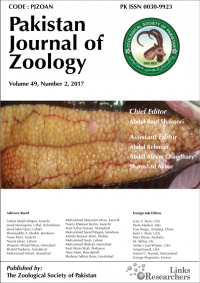1 Institute of Pure and Applied Biology, Bahauddin Zakariya University, Multan 2Department of Zoology, Wildlife and Fisheries, University of Agriculture, Faisalabad
3Department of Biochemistry, University of Agriculture, Faisalabad
* Corresponding author: fariha.latif44@hotmail.com
ABSTRACT
Lead (Pb) is a widely used metal in various industrial processes and is very persistent in the aquatic environment. The main objective of this study was to assess the time and dose dependent effects of Pb on bioaccumulation and oxidative stress in the liver, kidney, gills, muscles and brain of Cirrhina mrigala. The 120-days old fish were exposed to 1/4th (11.81mgL-1) and 2/3rd (31.49mgL-1) of 96-h LC50 of water-borne Pb for three fortnights (42 days) in glass aquaria at pH 7.5, temperature 30°C and total hardness 250mgL-1. After each fortnight, fish were sampled from each treatment and different organs such as liver, kidney, gills muscles and brain were taken out for determination of bioaccumulation and oxidative stress in the fish. The results showed that water-borne Pb exposure caused significant accumulation in the fish tissues that increased significantly with increasing exposure of Pb. Pb accumulated variably in the fish tissues as liver > gills > brain > kidney > muscles. Oxidative stress in the Pb exposed fish was determined in terms of change in the activities of antioxidant enzymes viz. superoxide dismutase (SOD), catalase (CAT) and peroxidase (POD). The Pb exposure caused a significant time and dose dependent increase in the SOD and POD activities in selected tissues of C. mrigala while a significant decrease in the CAT activity was also observed. Liver showed a significantly higher activity of all the three enzymes that could be due to its actively metabolic nature. Pb can inhibit the functional properties of CAT by disrupting disulfide bond. Moreover, the interference of Pb in the activity of SOD was also reported during present investigation. Therefore, this study provides an insight in rational use of antioxidant enzymes as biomarkers of oxidative stress in the bio-monitoring of aquatic pollution.
To share on other social networks, click on any
share button. What are these?










